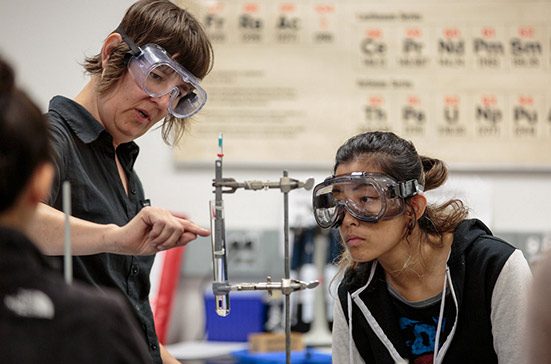Chemistry (CHEM)

about Chemistry (CHEM)
Chemistry addresses the fundamental nature of substances and the changes these substances undergo. For example, what is caffeine? How does caffeine affect your brain? How can we detect caffeine and determine how much is in coffee tea or your blood? What chemical reactions can be carried out to synthesize caffeine in the laboratory?
Modern civilization is based on energy obtained primarily from burning carbon and hydrocarbons with the result that carbon dioxide levels in our atmosphere have been steadily increasing since the industrial revolution. What are the alternatives? Is the hydrogen economy practical or feasible? What about nuclear fission and nuclear fusion reactors?
Our mission includes:
- Preparing students for transfer to four year institutions and for careers in the sciences and in the health industry.
- Stimulating curiosity about what stuff is made of, how it behaves and how substances are used in technology.
- Providing undergraduate research opportunities that are not available anywhere else.
2024-2025 Catalog
Course Descriptions and Program Requirements
Get Help from a Counselor
Having trouble navigating the program? We are here to help!
What you will learn:
Chemistry addresses the fundamental nature of substances and the changes that substances undergo . Students learn problem-solving skills rooted in the scientific world view. Specifically, you will learn about the chemical aspects of everyday life enabling you to understand the chemical foundations of the environment, energy, disease (causes and prevention), and the chemical basis of nutrition . The study of chemistry helps you understand the fundamentals controlling the interactions of elements and molecules which form the basis for our world and the universe . Knowledge of the discipline enables you to practice the protocols and techniques for working safely with chemicals . Modern civilization is based on chemistry and its effects upon the environment and ourselves . Some of the consequences are considered better than others and studying chemistry allows us to search for alternatives that may be practical or feasible .
Recommended Course Sequence
For Science Majors:
- Chem 1A – 1st Semester General Chemistry (Math 203 and Chem 30A are prerequisites).
- Chem 1B – 2nd Semester General Chemistry (Chem 1A is prerequisite).
- Chem 12A 1st Semester Organic Chemistry (Offered at Merritt, Laney or BCC).
- Chem 12B 2nd Semester Organic Chemistry (Offered at Merritt, Laney or BCC).
For Allied Health Majors:
- Chem 30A – Introductory General Chemistry (Math 201 is prerequisite).
- Chem 30B – Introductory Organic and Biochemistry (Chem 30A is prerequisite).
What can I do with a degree in Chemistry (CHEM)?
Careers in chemistry include analytical chemist, biotechnologist, biochemist, chemical engineer, dietitian, environmental chemist, food and drug inspector, forensic chemist, geochemist, health professional, pharmacist, professor, and many others. Doctors and nurses often have undergraduate degrees in chemistry.
Faculty
Peter Olds
Eileen Clifford
eclifford@peralta.edu
Jacob Schlegel
Alex Madonik
amadonik@peralta.edu

